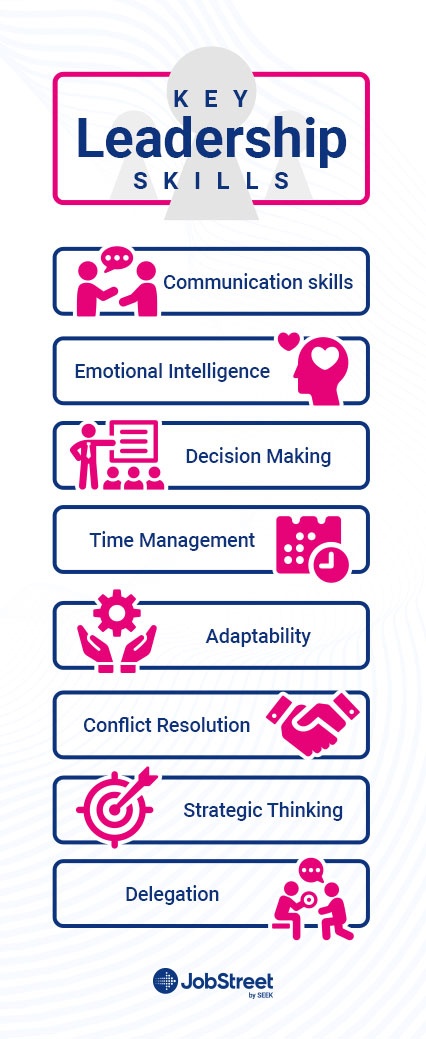Leadership Skills : Top Qualities of a Good Manager (with examples)
Leadership requires more than a list of credentials or technical expertise. Effective leadership skills improve your ability to guide others to meet shared goals and fulfill responsibilities.
Leadership soft skills are just as important as specialized credentials, as they can help you address issues you may encounter in your professional and personal life. In this article, you’ll find the top 8 skills that can make you an effective leader.
Understanding leadership

Different leadership styles fit different situations, so it’s up to you to find the best one for your specific work environment. Some common leadership styles are hands-on. Other leadership styles allow the people you lead to exercise more independence.
Effective leaders must be able to keep employees and delight their customers. Successful leaders need a mix of decisiveness, integrity, and resilience. Being self-aware helps you see the big picture clearly. Leaders who have emotional self-awareness can understand their emotions relative to their performance. Workplace Psychologist Tasha Eurich explains that having self-awareness means gathering honest feedback from yourself and others to become a better leader.
Key leadership skills

When you know your strengths and weaknesses, it’s easier for you to set specific goals to develop valuable leadership skills. Goals are best achieved through small, consistent steps. You can develop leadership skills through continuous learning and development. An effective leader brings out the best in people by empowering them and making sure they grow personally and professionally.
1. Communication skills
Leaders who communicate well have more credibility and can connect with the people they lead. In a busy workplace, it’s important to connect with people as they are your company’s most important asset. Develop strong communication skills by practicing active listening.
Active listening means paying attention to what people say. Listen to understand, not to respond. Remember the details they mention, and listen as much as possible. Let them finish what they are saying before you speak. Empathize with your colleagues and peers when they share something about themselves.
Use nonverbal cues to show that you are engaging in the conversation. Make eye contact, don’t check your phone during a conversation, and nod or smile when appropriate.
Once you understand what a person is saying, then you can respond well and give useful feedback. Ask questions to clarify and avoid misunderstandings. If you discuss specific goals and responsibilities with your staff, let them respond. Ask them if they have any questions or clarifications.
Strong communication skills will assist in relationship building and contribute to employee engagement.
2. Emotional intelligence
Emotional intelligence is a valuable leadership skill. It is the ability to recognize, understand, and manage emotions. As a leader, you need to identify how your emotions can affect the emotions and behavior of others positively or negatively. It’s also important to be aware of the emotions of others in your team or department.
If an employee reveals that they are having difficulties with another team member, ask them why. Do your best to withhold your judgment. Show empathy while listening to the reason for the disagreement, and work with your team members to resolve it together.
The ability to develop strong relationships in your leadership role will contribute to team building and employee motivation.
3. Decision making
According to a report from the University of Kansas, wise decisions made by leaders help an organization move in the right direction for its stakeholders and employees. A leader’s decisions can impact many people in a company.
You can make the decision-making process less intimidating by dividing it into smaller steps. An article from the Harvard Business Review discusses a model that improves decision-making within an organization. It proposes that managers should bring multiple perspectives into the decision-making process.
Explore different decision-making models and see what works best for your team and the specific situation. Let’s say that you and your team must deal with several customers leaving negative reviews all over your company’s social media. There are different ways to decide on how to handle this:
- You decide what to do about the situation and inform your team.
- You gather input from other team members then you decide what to do.
- You and your team come to a consensus on what to do.
- You and your team try for a consensus and don't reach one, so you make the decision.
- You delegate the decision-making process to your team members but set the parameters for their decision.
4. Time management
Leaders with good time management skills get more things done and model productivity and efficiency. There are several techniques to make the most of your time. One way is to use a planner consistently. Listing down your tasks (on paper or digitally) can help you visualize them better and organize your thoughts more.
You can also manage your time more efficiently by setting SMART goals and planning your objectives. Think about what you want for your team and each member’s development, including yourself as a leader. Time management skills can contribute to making your team successful.
Schedule a year-end meeting with your team to make plans for next year. List down your major goals for the year. You can then identify the objectives you need to achieve throughout the year to meet those goals. Plan these out on a calendar that is accessible to everyone and can be seen easily. This can keep you and the team focused and help everyone to manage their time better.
5. Adaptability
We’ve all seen how things can change in the workplace within a few years after the COVID-19 pandemic. Now, more than ever, adaptability and flexibility are strategic leadership skills that can benefit your personal and professional life.
Resistance to change in the workplace can lead to a drop in productivity or disconnection of goals among employees. As a leader, modeling adaptability is the best way to encourage others to adapt. Being adaptable is about using creativity and innovation to solve problems, generate new ideas, and put those ideas into action in unique and exciting ways.
Let’s say your company is doing vision casting and wants to map out its direction and future. During this transition, show your adaptability by keeping an open mind. Listen to others who share their ideas and suggestions. Show a positive attitude toward change and encourage others to do the same.
6. Conflict resolution
Disagreements can and will happen in every workplace. It’s a leader’s job to identify and resolve conflicts so that people can continue working together in a safe and healthy environment. Conflict resolution is the process of resolving disagreements efficiently, free from any biases.
When employees don’t see eye to eye on certain issues, effective leaders step in to determine the best course of action. You might need to negotiate with disagreeing parties to resolve their issues. Prove your leadership skills by being impartial when resolving a conflict.
If you have two team members who don’t want to work with each other, you’ll need to address why. Find out the reason behind their conflict. Talk to each of them and use your active listening skills. Then, ask if they are willing to talk about the situation together while you moderate them. Look for the best solution to the conflict and how to prevent it from happening again in the future.
7. Strategic thinking
Strategic thinking is the ability to think long-term and see the big picture. As an effective leader, you’ll be thinking about the growth of your company and ways to maintain its success, and the success of your team or department, for years to come.
Using strategic management tools such as the SWOT analysis can help you manage your team’s workflow and meet organizational goals. Knowing what your team is strong at and what needs improvement can have an immediate impact on productivity. Identifying opportunities and threats can also help the people you lead work more effectively.
There are several other models that you can use with the SWOT analysis to best determine your strategies moving forward. One example is the PESTLE analysis tool. PESTLE stands for Political, Economic, Social, Technological, Legal, and Environmental. This tool is used by companies launching a new product or service. It serves as a guide that can help you create and implement strategies based on the external environment surrounding your team or organization.
For example, a restaurant that relies mainly on foot traffic for customers can look at social factors such as buying trends on holidays. This might help to increase customers or orders.
8. Delegation
Being an effective leader doesn’t mean you should always be at the forefront of everything. You need to have the time and energy to always keep the big picture in mind while managing an entire department, team, or several people. Some tasks might multiply or pile up, so you need to learn how to delegate.
When you delegate some tasks, you can focus on other, more important tasks while empowering the people around you. An effective leader delegates tasks based on a team member’s strengths. Through delegation, you can also find ways to address a person’s weaknesses. Eventually, you'll see who among your team can become leaders too.
You’ll need to assess who among your team members is ready for more responsibilities. Remember to give clear instructions. You’ll also need to balance how much autonomy they have when fulfilling these responsibilities. Delegation exposes your team members to new experiences that can hone their skills or help them to tackle their weaknesses.
If your team needs to do a presentation you can assign and divide the tasks for the presentation among different team members. Consider each person’s strengths, and oversee them as they complete the presentation together.

Conclusion

Effective leadership skills benefit you and your peers, in your personal and professional life. You can research different leadership styles to see what suits you and your team best. It’s important to develop self-awareness, identify your strengths and weaknesses, set goals for your leadership development, and continue to learn and improve to be more effective as a leader.
Observe the characteristics of successful leaders around you. Key skills that you can focus on developing as a leader are communication, emotional intelligence, decision-making, time management, adaptability, conflict resolution, strategic thinking, and delegation.
In a leadership position, you’ll encounter many challenges in the workplace, such as conflict, sudden change, and a steady flow of work. These challenges can also be growth opportunities and can strengthen your leadership skills.
FAQs
- What are the most important leadership skills?
Many characteristics make a person a successful leader. Some of the most important positive leadership skills include communication, emotional intelligence, decision-making, time management, adaptability, conflict resolution, strategic thinking, and delegation.
- What is the importance of leadership skills in the workplace?
When you have strong leadership skills, you can improve communication between team members. You can also build relationships, make informed decisions, and help team members manage their time more. A good leader encourages people to be adaptable and open to change. They help resolve conflicts, see the big picture, and empower people using delegation.
- Can leadership skills be developed or are they innate?
Yes, you can develop your leadership skills. While some people can come across as natural leaders, leadership skills can be developed through formal training programs, self-study, coaching, mentoring, and hands-on experience. Be prepared to invest your time, patience, and resources as you develop these leadership soft skills.
- What are some ways to improve my leadership skills?
You can improve your leadership skills by practicing self-awareness. Be conscious of your strengths and weaknesses and set specific goals for leadership development. You can build up good leadership skills through continuous learning and development.
- How can I identify my strengths and weaknesses as a leader?
You can assess your strengths and weaknesses by developing self-awareness and being open to feedback and correction. You can ask for feedback from others, such as your mentors and peers, regarding what they see as your strengths and weaknesses. You can then compare these against what you consider your strengths and weaknesses are.
- How can I apply leadership skills in my personal life?
Leadership skills are also interpersonal skills and can be applied when dealing with people, in or outside the workplace. You can use communication, conflict resolution skills, and emotional intelligence to improve relationships. You can also use leadership skills to make wiser decisions, manage your time, adapt better to changes, delegate responsibilities, and think more strategically about your future.
- How can I improve my communication skills as a leader?
Develop your communication skills by practicing active listening. Pay attention to what people say and remember the details they mention. Use nonverbal cues, such as eye contact, to show that you are engaging in the conversation. Listen to understand, not just to respond.
- What is emotional intelligence and why is it important for leaders?
Emotional intelligence is an interpersonal leadership skill. It is the ability to recognize, understand, and manage emotions. Emotional intelligence allows you to listen and put yourself in other people’s shoes. It helps you connect with people and increases the amount of trust they have in you.
- How can I practice good time management as a leader?
There are several methods that you can use to manage your time more effectively. One simple way is to use a planner consistently and list your daily, weekly, and monthly tasks. Doing so can help you visualize them better and organize your thoughts more. You can also manage your time more efficiently by setting SMART goals and planning your objectives personally and with your team members.
- How can I motivate my team?
You can motivate your team by exercising interpersonal and strategic leadership skills. Good leaders can motivate employees to be more effective, productive, and collaborative. You can set SMART goals to manage expectations in the team, help resolve disagreements to keep the workplace safe, and empower team members by delegating more responsibilities when they are ready.
- What are some common leadership mistakes to avoid?
Avoid the following: not communicating clearly with others, not being empathic, being indecisive, not managing your time, being inflexible and not adapting to change, allowing conflicts to escalate, and not resolving them, not considering the big picture, and refusing to delegate.
Learn more tips on being a good leader by visiting JobStreet’s Career Advice page for valuable career advice! #SEEKBetter jobs by downloading the JobStreet app from the App Store or Google Play.
